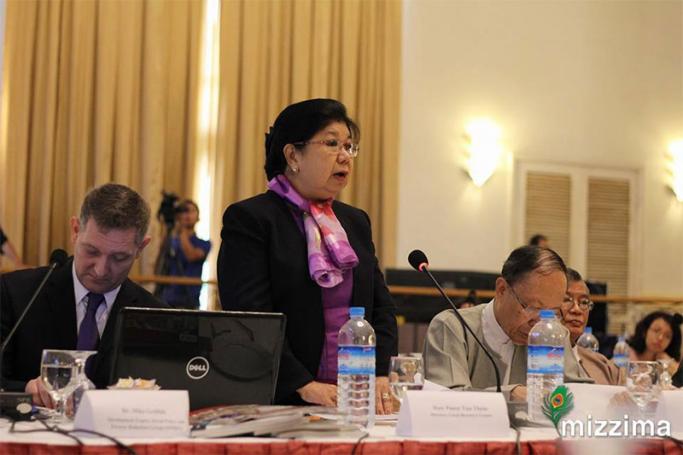When we talk about Equitable and All-inclusive Development of Myanmar, it is necessary to take gender equality issue into account. Daw Pansy Tun Thein raised the issue at the Policy Dialogue on Equitable and All-Inclusive Development in Myanmar, held at Yangon’s Inya Lake Hotel, on 18 June, jointly organized by ActionAid Myanmar, UMFCCI and Mizzima Media.
She suggested that women participation should be higher since 52% of Myanmar population are women. However, only 38% of the women are working while the rest are just staying at home. Daw Pansy Tun Thein highlighted how women’s participation is essential to achieve equitable and all-inclusive development of Myanmar.
She said that women’s participation is still a challenge due to traditional beliefs in the country. “Some still consider the main job of a woman is to reproduce and men are nobler than women. Women are still not household leaders and decision makers in many places,” said Daw Pansy Tun Thein.
She also stated that just providing jobs to women does not mean that they have have equality unless they can get to a higher position and break through the glass ceiling. Domestic work is still their job because their husbands are not sharing the responsibility. Therefore, women are struggling in their daily life. Moreover, the government is also giving more opportunity to men than women. For example, men are prioritized when it comes to government budget allocations.
The Myanmar government has signed many different gender equality contracts, such as the Convention on the Elimination of All Forms of Discrimination Against Women (CEDAW), the Beijing Platform for Action (BPA), the National Strategic Plan for the Advancement of Women (NSPAW). “Each organization provides recommendations to improve gender equality in Myanmar, but many of those cannot be implemented due to the government’s weak commitment,” she said. Moreover, men still dominate state and non-state governance bodies in Myanmar.
“ There are more women in the country, and if they are not part of developing programs, there is no way to succeed. They need to stop leaving women behind, and stop keeping them out of decision making processes,” she said.
Gender equality needs to be taken into account when discussing development
20 June 2017
Gender equality needs to be taken into account when discussing development












